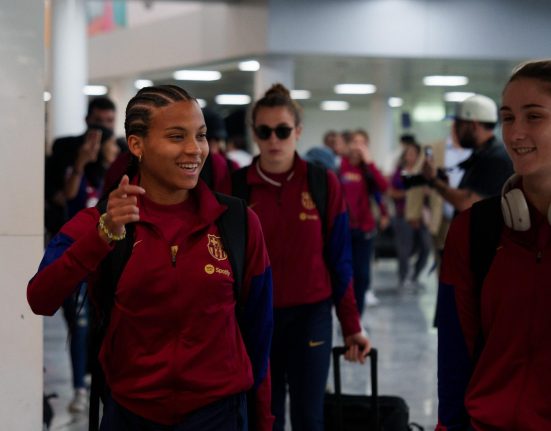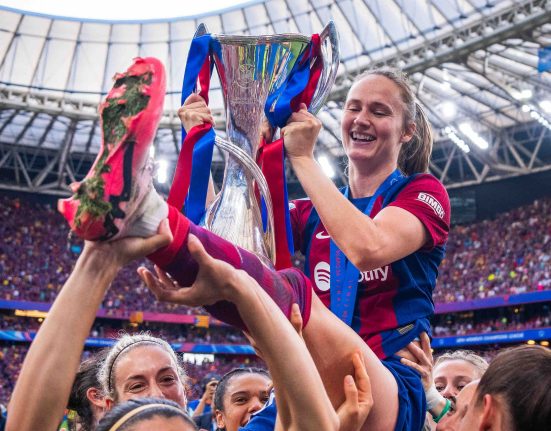
Overview of Joan Laporta’s first three years of his second term as Barcelona president.
Three years ago today marked the beginning of the second ‘Laporta era’ at FC Barcelona. With 30,184 votes (54.28%), the former president, who led the club from 2003 to 2010, surpassed Víctor Font’s 16,679 votes (29.9%) and Toni Freixa’s 4,769 votes (8.5%). Now, halfway through the term and just over two years away from the start of the new electoral campaign, the current board has been immersed in a situation characterized by post-Covid challenges and financial difficulties, which led to Messi’s departure, salary cuts, and unattainable signings. According to Sergi Sole of Mundo Deportivo however, despite these obstacles, Barcelona clinched all six league titles in the 2022-23 season, as the return of a Spotify Camp Nou draws closer.
Bound by fair play
The economic effects of the pandemic (from €990 million in revenue in 2018-19 to €631 million in 2020-21) weighed heavily on Laporta’s board, which chose not to join the LaLiga-CVC pact alongside Madrid and Athletic during a period of strained relations with Javier Tebas. Had they done so, Leo Messi wouldn’t have tearfully departed in August 2021. Griezmann followed suit as another measure to reduce the wage bill and comply with LaLiga’s stringent financial fair play regulations. Despite Koeman winning the Copa and nearly staging a comeback in the league, Laporta hesitated but retained him until his dismissal, with Xavi arriving from Qatar in November 2021. They couldn’t avoid elimination in the Champions League group stage but qualified for the next round, where they failed to progress to the round of 16. They also didn’t reach the quarter-finals in the Europa League. The financial setback worsened. While they did win the league and the Supercopa last season, Xavi, still at zero, has already announced his departure. Qualifying for the 2025 Club World Cup with a guaranteed €50 million requires reaching the Champions League semi-finals.
€241.4 million in signings
Mateu Alemany and Jordi Cruyff skillfully orchestrated free transfers for Memphis, Eric, Agüero, Alves, Christensen, Kessie, Iñigo, and Gündogan, while Aubameyang, Bellerín, and Marcos were released, and Adama, Luuk de Jong, Cancelo, and Joao Félix were loaned out. There was funding for Ferran (€55 million + €10 million) and “leverage” for Raphinha (€58 million + €7 million), Lewandowski (€45 million + €5 million), Koundé (€50 million + €12.5 million), and Vitor Roque (€30 million + €31 million), but it didn’t stretch to cover Busquets’ replacement, only amounting to €3.4 million for Oriol Romeu. The youth academy has helped cushion the financial blow.
The Women’s team, the number one reference
It’s the great football joy for Laporta, who inherited the squad that won the first Champions League in 2021. In 2023, they clinched another title even without Alexia Putellas, who was injured and now has her contract up for renewal. With Aitana Bonmatí leading the way, it’s the only profitable section. They filled Camp Nou, generated €14 million in the 2022-23 season, and the forecast is €17 million for 2023-24.
Coach turnover but full sweep of 6 leagues
Lluís Cortés did not continue after winning the Women’s Champions League. He was replaced by Jonatan Giráldez, also a champion, who will move to the USA in July. Xavi Pascual was the European handball king like his successor, Antonio Carlos Ortega. Roger Grimau arrived last July for Saras Jasikevicius (two leagues and two cups in three years) amidst a basketball transition that saw the departure of Nikola Mirotic. Jesús Velasco won the Futsal Champions League in 2022, a year and a half after his predecessor, Andreu Plaza. Only Edu Castro (roller hockey) remains from Josep Maria Bartomeu’s tenure. The sections have remained competitive, and in the 2022-23 season, the milestone of six leagues from six professional teams was achieved. At Barça Atlètic, García Pimienta departed in June 2021, Sergi Barjuan in June 2022, and Márquez remains in charge.
Executive departures
In addition to Deco by Mateu Alemany and Jordi Cruyff since this summer in the sports area and in September by the architect of the women’s team, Markel Zubizarreta, the executive sector has been a constant source of news. CEO Ferran Reverter left in February 2022 without completing a year at the club. Laporta does not have a general director and opts for an Executive Committee with strong leaders in each area, believing that Barça should be run like a large family business, in a presidential manner. Treasurer Ferran Olivé is Laporta’s main support, who surrounded himself with trusted people but has been losing heavyweight executives such as Ramón Ramírez, director of Heritage, in June 2022, Alex Barbany, executive director and operator of Espai Barça, in September 2023, and Maribel Meléndez, corporate director, last week after being instrumental in securing financing for Espai Barça. The only resignation from the board was that of Jordi Llauradó, who opposed the choice of the Turkish company Limak in January 2023 to build the new Spotify Camp Nou with its 104,600 covered seats.
Leverage activated to survive
To strengthen the team in the 2022-23 season, the club opted to sell assets in exchange for liquidity. In June and July 2022, it sold 25% of LaLiga TV rights to Sixth Street for 25 years for €522.5 million (€667.231 million capital gain recognized). Between July and August 2022, it transferred 24.5% of Barça Vision to Socios.com and another 24.5% to Orpheus Media (Jaume Roures) for €100 million each. The book value of both transactions in 2022-23 was €208.163 million. In August 2023, Libero Football Finance AG and Nipa Capital repurchased 29.5% of that 49% external stake from the club for €120 million. However, Libero failed to pay the agreed €40 million before December 2023 and received a lawsuit from the club, which also saw its project go public on the New York Stock Exchange with Barça Media thwarted. The current structure of Bridgeburg Invest SL is Barça (51%), Nipa Capital with an investment fund based in Cyprus (19.7%), Socios.com (17.1%), Orpheus Media (2.4%), and Libero Football Finance AG (would hold 9.8% but has not made the payments). Barça Innovation Hub and Barça Licensing & Merchandising (BLM), the retail business and crown jewel that the board is reluctant to part with, remain 100% owned by the club. The big battle today is with Nike to potentially earn more from the kits, with the option to end a relationship established in 1998 and create their own brand while waiting a year to sign with another “giant.”
Need for income
While Joan Laporta insists on the club’s viability, rejecting even the model of a PLC akin to Bayern, the club is working to cover the money owed by Libero with other investors and more sponsorships. The budget for 2023-24 anticipates €859 million in ordinary income. Considering that they proceed to 1/4 of the Champions League and without the pending amount from Libero, there is currently a deviation of about €30 million. There is confidence within the club in balancing the books and potentially reaching the 1/1 rule of La Liga in the upcoming summer transfer window. The gross debt (excluding Espai Barça) is €1.2 billion and the net debt is €552 million according to calculations based on LFP methods.
Sponsors with global resonance
Marketing is another area with potential. Last year, 20 new sponsors were signed. The partnership with Spotify since July 2022 brings in €67.5 million annually until 2026 with the naming rights for Camp Nou and global exposure during Clásicos featuring Drake, Rosalía, and the Rolling Stones on the jersey. For the sleeve of the jersey, there is a contract with Ambilight TV, a subsidiary of Philips, worth €56 million in total until 2026. And for the women’s team, there is an annual fixed deal with Bimbo for €3.5 million.
A very expensive exile
Following the record of €229 million for the Stadium and the Museum in the 2022-23 season with an average of 83,497 spectators, only 17,064 members subscribed to the Olympic Stadium. At the Spotify Camp Nou, there were 82,500. There is disaffection with an average attendance of 40,948 while awaiting the progress of the temple’s construction. With the financing of €1.450 billion signed with 20 investors (led by Goldman Sachs and JP Morgan), the goal is to return by the end of 2024 for the 125th anniversary with 60% capacity. The works are “on time,” assures the club, to be completed by June 2026. For the Palau Blaugrana, planned for 2028, the design is still being redefined.






